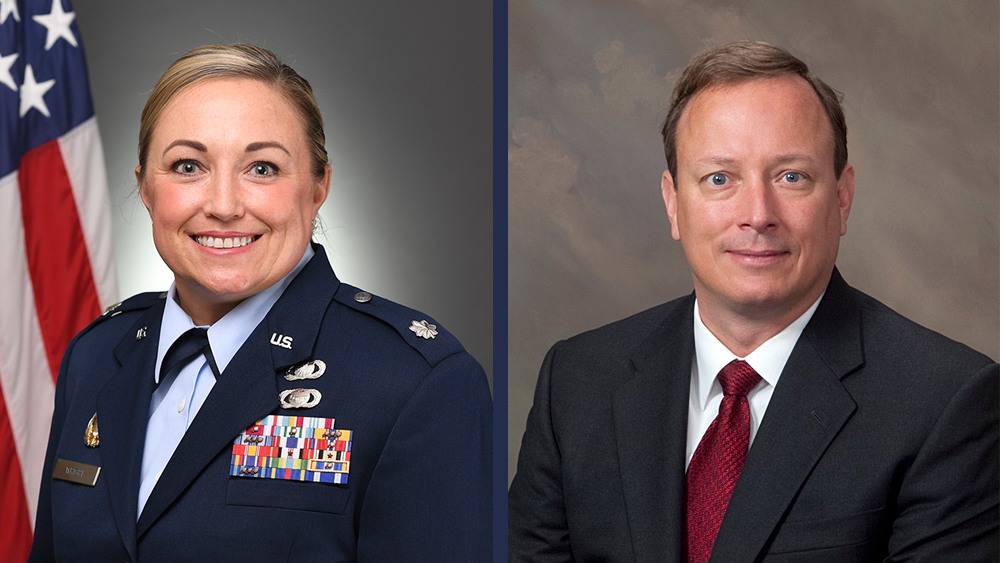
Military Lessons for Business Leadership: Two Darden Voices of Experience
By Jay Hodgkins
Years serving in the military have helped Jessica Wright and Ty Schieber clearly identify some of the traits that define effective leadership.
Connections they share with The Executive Program (TEP), a component of the Darden School of Business and Darden Executive Education & Lifelong Learning (EELL), have underscored how those traits apply to business settings as well.
Wright, an active-duty lieutenant colonel of the U.S. Air Force with 18 years of service, is deputy division chief, Global Strike Division, under the Office of the Assistant Secretary of the Air Force for Acquisition. She is a member of the Darden TEP class of 2024.
Schieber, an 11-year veteran of the U.S. Marine Corps who earned the rank of major, now serves as a managing director with Darden EELL, where he develops custom learning programs for military, government, defense and aerospace industry clients.
The Darden Report caught up with Wright and Schieber to learn more about their experiences and observations on leadership in military and business settings.
Q: What qualities make a good leader?
Wright: Empathy! As a leader, if you can’t empathize with others you can’t be effective; no one of us is the same as the other. I will never advocate to change a standard someone is accountable to, but I will change my approach in how I assess a standard or handle an issue.
Effective communication, both written and verbal, is vital. A key enabler to effective communication is being able to triage information. Take in a huge amount, digest it and spit it back out in a very condensed way for senior leaders to make informed decisions.
Humility. The day I learned how little I actually know was the day I became the smartest I’d ever been.
Having a growth mindset versus a fixed mindset.
Those things apply to all elements of leadership — the business side, the personal side, in the military and in the civil sector.
Schieber: A good leader has to be a good listener. A good leader should understand their strengths and weaknesses. A good leader should also be a good follower, to a point. A good leader should be someone who cares deeply about their people — understanding what makes them tick, what their aspirations are, how they want to grow. Doing anything worth doing is an inherently interdependent endeavor. Sometimes I’ll stand on your shoulders, sometimes you’ll stand on my shoulders, but most of the time we’re going to be standing shoulder to shoulder, making things happen. If you don’t understand that interdependency and your responsibility as a leader to support and enable those that serve with you and under you, you’re going to fail.
Q: How have your military and business leadership experiences influenced how you approach leading change?
Schieber: The operating environment when you’re in the military — whether you’re in the field or in garrison — there are dynamic forces that shape behavior, shape action, shape how you plan. The only constant you have is change. I was inculcated with that as an operating paradigm before I left active duty. But it proved to be incredibly useful when I got into a company, and I was able to navigate the myriad dynamic forces in the business operating environment effectively. When you’re accustomed to everything changing all the time, you grow resilient and agile in being able to identify obstacles and navigate around them with the resources you have to get to get it done.
Q: How have your experiences influenced your approach to managing crisis?
Wright: Managing crisis in the military is almost an everyday event. It’s just a matter of scale and magnitude. Transferring that to a business mindset, you realize that everyone has crises. It’s just a different color and the stakes are different. But ultimately, there’s an order of operations in working through crisis. If you have enough, what I call, sets and reps, you’re able to look at a situation, process and analyze it, and then determine the way forward. More often than not, the core of that framework is going to be the same whether you’re in the midst of a military or business crisis.
Q: And how about your approach to strategic thinking?
Schieber: I was fortunate in my career to get a good look at the importance of framing the problem set, framing the mission, and giving clear direction and delegation to subordinates so that I could focus on things that I was uniquely equipped to do. That training and experience early on equipped me to adopt the same model in business.
That’s really the only way to roll because, if you don’t learn to trust, empower and delegate tactical and operational level tasks as an executive, there’s no way you’re going to be able to stay afloat. Instead, you make sure, as a servant leader, you’ve given the right tools and resources to the folks who are carrying that really important part of the load, to enable them to successfully get it done.
Q: How did your experience in The Executive Program (TEP) impact how you lead in your current position?
Wright: One of the things I do more now than I did before TEP is seeking to truly understand what both sides need as an outcome. With defense contractors, what are their stressors, motivators and atmospherics; how are we complementary or how are we pressurizing those factors. Because at the end of the day, we all want the same thing. We all want to carry forward the ideals of democracy, capitalism, freedom and all the things represented in our Constitution.
Also, being able to look back and think through those nonacademic moments of water cooler talk or a dinner with my cohort when someone would say, “Yeah, we dealt with XYZ.” Especially being in the military, it is really important to me personally to surround myself with people who don’t look and talk just like me. Having exposure to such a diverse, cross-cutting group of people was really special.
Darden and Executive Education & Lifelong Learning (EELL) have a long-standing history of working with U.S. military and federal government agencies to develop leaders at every level, including a 50-year partnership with U.S. Navy, which was recognized in 2023. Learn how EELL can work with your agency to address mission critical business and leadership challenges.
The University of Virginia Darden School of Business prepares responsible global leaders through unparalleled transformational learning experiences. Darden’s graduate degree programs (MBA, MSBA and Ph.D.) and Executive Education & Lifelong Learning programs offered by the Darden School Foundation set the stage for a lifetime of career advancement and impact. Darden’s top-ranked faculty, renowned for teaching excellence, inspires and shapes modern business leadership worldwide through research, thought leadership and business publishing. Darden has Grounds in Charlottesville, Virginia, and the Washington, D.C., area and a global community that includes 18,000 alumni in 90 countries. Darden was established in 1955 at the University of Virginia, a top public university founded by Thomas Jefferson in 1819 in Charlottesville, Virginia.
Press Contact
Molly Mitchell
Senior Associate Director, Editorial and Media Relations
Darden School of Business
University of Virginia
MitchellM@darden.virginia.edu




